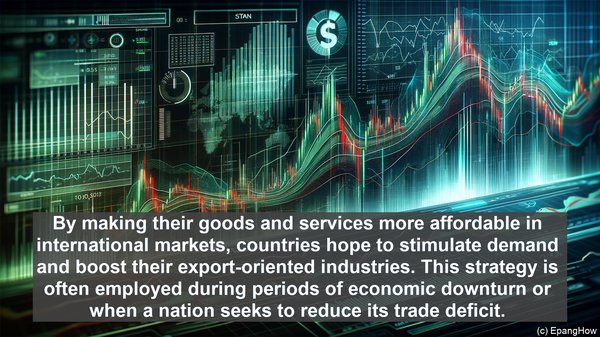Introduction: The Significance of Exchange Rates
Greetings, ladies and gentlemen! In the intricate world of global commerce, exchange rates play a pivotal role. They determine the value of one currency in relation to another, influencing trade dynamics. Amidst this, the concepts of competitive devaluation and currency manipulation emerge, each with its own implications. Today, we embark on a journey to demystify these terms, unraveling their differences and implications.
Competitive Devaluation: A Tool for Economic Advantage
Competitive devaluation refers to a deliberate policy adopted by a country to lower the value of its currency relative to others. The primary objective is to enhance export competitiveness. By making their goods and services more affordable in international markets, countries hope to stimulate demand and boost their export-oriented industries. This strategy is often employed during periods of economic downturn or when a nation seeks to reduce its trade deficit.

Currency Manipulation: A Broader Spectrum
Currency manipulation, on the other hand, encompasses a wider range of actions. It involves both direct and indirect interventions in the foreign exchange market, aiming to influence the value of a currency. While competitive devaluation can be seen as a subset of currency manipulation, the latter includes additional tactics. These may include artificial buying or selling of currencies, imposing capital controls, or even enacting policies that restrict capital flows. The motivations behind currency manipulation can be diverse, ranging from gaining an unfair trade advantage to safeguarding domestic industries.
The Legal and Ethical Dimensions
The distinction between competitive devaluation and currency manipulation also lies in their legal and ethical aspects. Competitive devaluation, when carried out within the bounds of international agreements and without the intent to manipulate, is generally considered acceptable. However, currency manipulation, particularly when it involves unfair practices or violates established norms, can attract criticism and even lead to trade disputes. The International Monetary Fund (IMF) and the World Trade Organization (WTO) play crucial roles in monitoring and addressing such issues.
Implications for Global Trade and Relations
Both competitive devaluation and currency manipulation can have far-reaching consequences. While competitive devaluation may provide short-term benefits for the country adopting it, it can trigger a ‘race to the bottom’ scenario, where multiple nations engage in devaluation, leading to currency instability and market uncertainties. Currency manipulation, with its potential to distort trade flows and create imbalances, can strain diplomatic ties and hinder multilateral cooperation. Recognizing these implications, international forums continually strive to promote fair and transparent exchange rate mechanisms.

